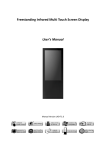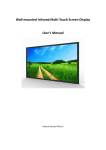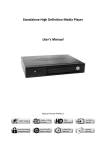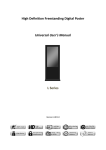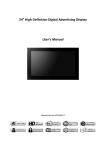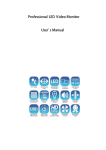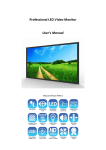Download AllSee Technologies PF65HD Specifications
Transcript
Wall‐mounted Infrared Multi Touch Screen Display User’s Manual Manual Version MTA1.0 Wall‐mounted Infrared Multi Touch Screen Display User’s Manual Our Full Product Range Page 1 Wall‐mounted Infrared Multi Touch Screen Display User’s Manual Safety Instructions Please keep the display away from any heat sources such as radiators or direct sunlight. Place the display in a stable and well‐ventilated place. Please handle with care as product contains glass. The holes or openings on the display are designed for ventilation. Do not cover or block the ventilation holes or openings. Remove protective covering from the screen before you use the display. As the display surface is vulnerable to scratches, avoid touching the surface with sharp pen point. Shut off the power supply before cleaning. Use a soft lint‐free cloth instead of a tissue to wipe the screen. You may use a glass cleaner to clean the product as required. However, never spray the cleaner directly onto the display surface. Do not attempt to repair this product yourself! Improper disassembly of the product will invalidate the warranty and could be dangerous. If you have a problem that cannot be solved using the "Troubleshooting" guidelines, please contact your supplier. Page 2 Wall‐mounted Infrared Multi Touch Screen Display User’s Manual Quick Start Guide This section of the guide allows quick setup and use of the unit. Please refer to the main part of the User Guide for full information on use of the unit. Please follow the steps detailed below: 1. Unpack unit and place in desired location along with PC. 2. Connect the screen to the PC via the VGA Cable and link the screen’s Infrared touch sensors to the PC via the USB cable (as shown below). Figure 1 Screen to PC Connections 3. Power ON the PC. 4. Take the power lead from the accessories bag, insert the lead into the screen and connect to mains outlet. The unit will power ON automatically. 5. Insert the CD included into the PC then access the CD‐ROM drive and open the file inside called TouchControl.msi. Follow the “TouchControl Setup Wizard” to install the software. 6. Restart the computer 7. Re‐launch the software then click “Calibration” to configure touch sensor points on the touch screen. 8. The screen should now be acting as a monitor and allowing you to use your finger as a mouse on the screen displaying the PC’s contents. Page 3 Wall‐mounted Infrared Multi Touch Screen Display User’s Manual Contents: 1. 2. 3. Introduction ................................................................................................................................ 6 1.1 Box Contents ................................................................................................................... 6 1.2 Product Overview ............................................................................................................ 6 1.3 Serial Control Box ............................................................................................................ 7 1.3.1 Connection to the screen ......................................................................................... 7 1.3.2 Serial Control Box Overview ..................................................................................... 8 1.4 Remote Control ............................................................................................................... 9 1.5 Replacing the Remote Control Battery ......................................................................... 10 1.6 Menu Operation ............................................................................................................ 11 1.7 Inputs ............................................................................................................................ 14 Set Up ........................................................................................................................................ 15 2.1 Connecting to PC ........................................................................................................... 15 2.2 Installing the touch screen driver ................................................................................. 17 2.2.1 Windows Driver Installation (32‐bit & 64‐bit) ....................................................... 17 2.2.2 Changing your display to portrait mode ................................................................ 23 F.A.Qs and Troubleshooting Guide ........................................................................................... 26 3.1 3.1.1 Input Source ........................................................................................................... 26 3.1.2 Display/monitor button on keyboard .................................................................... 26 3.2 3.2.1 4. My Touch Screen is not displaying what is on my PC .................................................... 26 My display turns itself OFF when it’s not connected to my PC ..................................... 26 Power saving function ............................................................................................ 26 3.3 My screen is displaying video signal but touch function is disabled ............................ 27 3.4 My TouchControl software is not launching ................................................................. 27 3.5 My Remote Control is not working ............................................................................... 28 3.6 My driver won’t reinstall on Windows XP .................................................................... 29 Full Range Specifications .......................................................................................................... 34 Page 4 Wall‐mounted Infrared Multi Touch Screen Display User’s Manual Table of Figures Figure 1 Screen to PC Connections ...................................................................................................... 3 Figure 2 Product Overview ................................................................................................................... 6 Figure 3 Serial Control Box to Screen Connection ............................................................................... 7 Figure 4 Screen Inputs ....................................................................................................................... 14 Figure 5 Screen to PC Connections .................................................................................................... 15 Figure 6 Serial Control Box to Screen Connection ............................................................................. 29 Page 5 Wall‐mounted Infrared Multi Touch Screen Display User’s Manual 1. Introduction Congratulations on your purchase of our product. Please read carefully and follow all instructions in the manual before first use. The product should not be exposed to liquids dripping or splashing and no liquid filled objects, such as vases, should be placed on the product. For user convenience, a number of operations can be performed through the remote control. Attention: 1. Do not change any default settings unnecessarily 2. Keep the product far away from water during installation and use. 1.1 Box Contents 1xWall‐mounted Infrared Touch Screen Display 1xPower Cable 1xVGA Cable 1xUSB Cable 1xCD (User Manual and Software Driver) 1xRemote Control 1xSerial Control Box 1.2 Product Overview Figure 2 Product Overview Page 6 Wall‐mounted Infrared Multi Touch Screen Display User’s Manual 1.3 Serial Control Box 1.3.1 Connection to the screen Before using the Remote Control the Serial Control Box (with the remote’s infrared sensor in it) must be connected to the screen. Figure 3 Serial Control Box to Screen Connection Unless Remote Control is faulty it is recommended that you do not attempt to change any settings with the Serial Control Box, only use it as a sensor for the main Remote Control. Once all required changes have been made the Serial Control Box can be disconnected. Page 7 Wall‐mounted Infrared Multi Touch Screen Display User’s Manual 1.3.2 Serial Control Box Overview Button Function → Right navigation button adjust volume ← Left navigation button select in OSD menu select signals input adjust values MENU Open/close OSD menu or return to previous menu ↓ Select signal input INPUT Signal input select Page 8 Wall‐mounted Infrared Multi Touch Screen Display User’s Manual 1.4 Remote Control Button Function Power Power ON or OFF Mute Disable audio ⓿‐❾ Numbers for time input ‐/‐‐ Input multiple numbers MODE Signal input select ← Left navigation button ↑ Up navigation button → Right navigation button ↓ Down navigation button OK Confirm selection MENU Open/close menu settings Page 9 Wall‐mounted Infrared Multi Touch Screen Display User’s Manual 1.5 Replacing the Remote Control Battery 1. Open the battery cover 2. Take out the battery box in the right direction as shown in the picture below 3. Remove the used battery 4. Insert the new battery with its terminals corresponding to the indicator 5. Put the cover back in Page 10 Wall‐mounted Infrared Multi Touch Screen Display User’s Manual 1.6 Menu Operation The Menu includes the following sub‐menus: Picture, Sound, System, Function and Geometry. First connect the Serial Control Box to the screen via the CAT5 port (as shown). Figure 4 Serial Control Box to Screen Connection When using the Remote Control please ensure that it is no more than 20cm away from the sensor on the Serial Control Box. This close proximity control feature is to ensure that you only control the desired device if there are others in its vicinity. Press “MENU” to enter Main Menu, press ←→ to select the right sub‐menu and ↑↓ to select the desired item, press “OK” to confirm selection. Press → where instructed to confirm sec on. Press “menu” at any time to go back or exit. PICTURE SOUND SYSTEM FUNCTION GEOMETRY Page 11 Wall‐mounted Infrared Multi Touch Screen Display User’s Manual Picture As with all settings these can be adjusted and changed back to default at any time. CONTRAST 50 BRIGHTNESS 50 COLOR TEMP <NORMAL> or WARM/COOL/USER DEFINED <STANDARD> or DYNAMIC/SOFT/USER DEFINED SCALE AUTO PICTURE MODE Sound EQUALIZER 120 50 500 50 1.5K 50 5K 50 10K 50 BALANCE 0 (LEFT/RIGHT SOUND DISTRIBUTION) SOUND MODE <USER> or STANDARD/MOVIE/MUSIC SURROUND <OFF> or ON Page 12 Wall‐mounted Infrared Multi Touch Screen Display User’s Manual System Here you can change all of the On Screen Display (OSD) settings such as menu brightness and how long it displays for. This sub‐menu also includes the fan settings so you can set what temperature the internal fan activates. OSD LANGUAGE <ENGLISH> or 中文 OSD H‐POSITION 50 (HORRIZONTAL POSITION OF THE MENU) OSD V‐POSITION 50 (VERTICAL POSITION OF THE MENU) OSD DURATION 15 (NUMBER OF SECONDS MENU WILL DISPLAY FOR) OSD HALFTONE 50 (BRIGHTNESS OF THE MENU) TEMPERATURE XX (INTERAL TEMPERATURE) FAN ACTIVE 30 (TEMPERATURE AT WHICH FANS BECOME ACTIVE) RESET > (RESETS ALL SETTINGS BACK TO DEFUALT) TIMER CURRENT TIME – XX.XX Function <OFF> or ONCE/EVERYDAY TURN OFF TIME – 00.00 TURN ON TIME – 00.00 CURRENT X 1 CURRENT Y 1 TOTAL X 1 TOTAL Y 1 LEFT EDGE 0 UP EDGE 0 RIGHT EDGE 0 DOWN EDGE 0 (VIDEO WALL FUNCTION) Page 13 Wall‐mounted Infrared Multi Touch Screen Display User’s Manual Geometry H‐POSTION V‐POSTION CLOCK PHASE Switching between inputs One crucial feature that does not appear on the Main Menu is selecting the input source. This is done by first pressing “MODE” and then scrolling down to the desired input source and select by pressing “→”. PC (VGA) HDMI DVI AV1 AV2 YPBPR 1.7 Inputs VGA – Video Graphics Array Signal Input (RECOMMENDED) HDMI – High Definition Multimedia Interface Signal Input DVI – Digital Video Interface YPbPr – Component Signal Input Video In (AV) – Composite Signal Input (X2) Figure 4 Screen Inputs Page 14 Wall‐mounted Infrared Multi Touch Screen Display User’s Manual 2. Set Up 2.1 Connecting to PC The touch screen must be connected to the PC in two ways: visually and interactively. The recommended visual connection is via the VGA Cable (included) meaning that the display acts like a monitor for the PC. The touch function is achieved by linking the Infrared touch sensors around the screen to the PC via the USB Cable (included). Figure 5 Screen to PC Connections IMPORTANT: Be sure to connect the PC to the USB port on the side of the input panel and NOT the one adjacent to the other inputs. Computer Touch screen Description VGA Output VGA input Computer drives the video display on the monitor Touch Input (USB) Touch Output (USB) Feedback from the touch monitor to the PC on where has been touched on the screen Connect the screen to the PC via the VGA cable and USB Cable (as shown above). Once these connections have been made and the PC powered ON take the power lead and insert it into the screen and connect to mains outlet. The unit will power ON automatically. Before taking any more steps ensure that the screen is sourcing its display from the PC. This is done by first pressing “MODE” and then scrolling down to the desired input source (PC) and select by pressing “→”. Page 15 Wall‐mounted Infrared Multi Touch Screen Display User’s Manual PC (VGA) HDMI DVI AV1 AV2 YPBPR IMPORTANT: If the Touch Screen is the only monitor connected to your PC DO NOT take the following step. Only proceed with the following if you are using a laptop or another monitor is connected to your PC. Access the display options from your Control Panel or right‐click on your Desktop and choose “Properties” (then “Settings”) or “Screen resolution”. You should now click “Detect” to allow the PC to discover the Touch Screen display then “Identify” to establish which display is the touch screen. Select the display that corresponds with the Touch Screen display then check the box “Make this my main display” or “Use this devise as the primary monitor”. This will make the Touch Screen display your main monitor. Page 16 Wall‐mounted Infrared Multi Touch Screen Display User’s Manual 2.2 Installing the touch screen driver The touch screen driver can only be installed on a Windows Operating System, to utilize multi touch function it must be installed on to a PC that is running Windows 7. All Windows Operating Systems before Windows 7 can support the single touch function. There are separate drivers for Windows PCs, one for 32‐bit and one for 64‐bit. To find out your operating system and system type click Start>right‐click Computer>Properties, which should bring up a window like this: Once you know your PCs operating system type you will know which driver to install. 2.2.1 Windows Driver Installation (32‐bit & 64‐bit) Insert the CD into the CD‐ROM drive on the computer. Using Windows Explorer access the CD‐ROM drive and open either the file called “WindowsTouchDriver32Bit.exe” (for 32‐bit) or “WindowsTouchDriver64Bit.exe” (for 64‐bit). This will prompt the installation of the touch screen driver that allows you to use your finger like a mouse on the monitor. You will first be asked what kind of installation you require, you will be given the following options. Page 17 Wall‐mounted Infrared Multi Touch Screen Display User’s Manual ETO, RS232 Series, Serial ‐ Single touch via Serial Port ETO,USB Series, USB ‐ Single touch via USB Port ETO, MT, Serial ‐ Multi touch via Serial Port ETO, MT, USB ‐ Multi touch via USB ETO, RS232, Serial ‐ Single touch via Serial Port If you require the multi touch function (ability to use two touch points on the display) then please select “ETO, MT, USB” as shown above. Please note that this function is only possible on Windows 7 however you must still select this option when using any other version. Then click “Install” and the following progress box will appear: At this stage you may be warned by Windows, or other software, that the publisher of the software cannot be verified, this is nothing to worry about it is simply because the software is unbranded and has no author signature. Proceed by installing the software regardless of any warnings. Page 18 Wall‐mounted Infrared Multi Touch Screen Display User’s Manual Once installation is complete this box will appear: Page 19 Wall‐mounted Infrared Multi Touch Screen Display User’s Manual Click “Close”. IMPORTANT: Restart the computer. Once your PC starts back up, still using your mouse, access the “Pointer Device Settings” found in the bottom right‐hand corner of the taskbar (under the hidden icons section). From here you can access all of your touch screen settings, including a Help section for more details on the system. Page 20 Wall‐mounted Infrared Multi Touch Screen Display User’s Manual Next you must calibrate your screen. Access the Pointer Device Services from the hidden icons and select Calibrate>UPDD>Calibrate. This will turn the screen white apart from a blue arrow; touch the screen on the point of the blue arrow. You will need to do this 4 times to allow the infrared sensors to calibrate. Page 21 Wall‐mounted Infrared Multi Touch Screen Display User’s Manual IMPORTANT: Restart the computer again. The screen should now be connected and fully operational. To make further changes or re‐calibrate the screen simply open Pointer Device Services at any time, it can be found in the bottom right‐hand corner of the taskbar (under the hidden icons section). Page 22 Wall‐mounted Infrared Multi Touch Screen Display User’s Manual 2.2.2 Changing your display to portrait mode IMPORTANT: If you require your content to display in portrait you must first calibrate your screen in landscape orientation before switching it to portrait orientation. Access the display options from your Control Panel or right‐click on your Desktop and choose “Properties” (then “Settings”) or “Screen resolution”. Page 23 Wall‐mounted Infrared Multi Touch Screen Display User’s Manual Select the “Orientation” dropdown menu then click on “Portrait (flipped)”. Click “OK” and your screen contents and operations will now be rotated 90° clockwise. You may be asked “Do you want to keep these display settings?” click on “Keep changes”. Page 24 Wall‐mounted Infrared Multi Touch Screen Display User’s Manual Page 25 Wall‐mounted Infrared Multi Touch Screen Display User’s Manual 3. F.A.Qs and Troubleshooting Guide 3.1 My Touch Screen is not displaying what is on my PC 3.1.1 Input Source Your Touch Screen may be sourcing its display from another input. First connect the Serial Control Box to the screen via the CAT5 port (marked REMOTE KEY BOARD on “Inputs” diagram Figure 5). When using the Remote Control please ensure that it is no more than 20cm away from the sensor on the Serial Control Box. This close proximity control feature is to ensure that you only control the desired device if there are others in the area. Press “MODE” and then scroll down to the desired input source and select by pressing “→”. PC (VGA) HDMI DVI AV1 AV2 YPBPR 3.1.2 Display/monitor button on keyboard Your keyboard may have a display/monitor button on it, especially if you are using a laptop. If your Touch Screen does not display the content of the PC try hitting this button before contacting your supplier. 3.2 My display turns itself OFF when it’s not connected to my PC 3.2.1 Power saving function If your Touch Screen display is powered ON without being connected to a PC via a visual signal (e.g. VGA, DVI etc.) it will automatically power OFF within a few minutes. If your Touch Screen display Page 26 Wall‐mounted Infrared Multi Touch Screen Display User’s Manual is not being supplied with a video signal it will power OFF so ensure that video signal connection is connected properly. Also you must ensure that the Touch Screen is accessing the correct input. To do this you must first connect the Serial Control Box to the screen via the CAT5 port (marked REMOTE KEY BOARD on “Inputs” diagram Figure 2). When using the Remote Control please ensure that it is no more than 20cm away from the sensor on the Serial Control Box. This close proximity control feature is to ensure that you only control the desired device if there are others in the area. Press “MODE” and then scroll down to the desired input source and select by pressing “→”. PC (VGA) HDMI DVI AV1 AV2 YPBPR 3.3 My screen is displaying video signal but touch function is disabled Please ensure the Touch Screen is connected to the PC via the USB Cable. Go though the steps in Section 2.2 to do this correctly. 3.4 My TouchControl software is not launching You may wish to re‐calibrate your screen or change some touch settings. If you are trying to open your driver software (TouchControl) and it will not launch it may be because it is already open. This software will launch every time on start up of the PC and run in the background constantly. It can be found in the bottom right hand corner of the screen in the hidden icons section. Page 27 Wall‐mounted Infrared Multi Touch Screen Display User’s Manual 3.5 My Remote Control is not working If you have unpacked your unit, powered it ON and the Remote Control does not seem to be working please connect the Serial Control Box first. The Serial Control Box has the remote’s infrared sensor in it and must be connected to the screen when operating the Remote Control. Page 28 Wall‐mounted Infrared Multi Touch Screen Display User’s Manual Figure 6 Serial Control Box to Screen Connection Unless Remote Control is faulty it is recommended that you do not attempt to change any settings with the Serial Control Box, only use it as a sensor for the main Remote Control. Once all required changes have been made the Serial Control Box can be disconnected. 3.6 My driver won’t reinstall on Windows XP You may have uninstalled the touch driver from a Windows XP PC and find that you are having trouble reinstalling it. First make the two connections again between the Touch Screen and your PC (section 2.1). Then reinstall the driver according to the steps in section 2.2.1. Once you have restarted your computer but before you calibrate, unplug the USB cable from your PC the plug it back in again. This will launch the”Found New Hardware Wizard”. Highlight the option that says “Install from a list or specific location (Advanced), like so: Page 29 Wall‐mounted Infrared Multi Touch Screen Display User’s Manual Click “Next”. When the next window appears you must highlight “Search for the best drivers in these locations.” and tick the box “Include this location in the search:” and select from the dropdpwn menu “C:\WINDOWS\inf”, like so: Page 30 Wall‐mounted Infrared Multi Touch Screen Display User’s Manual Your PC will then search for the Touch Screen via the USB cable. Once your PC has found the hardware and installed the driver you will see this message: Page 31 Wall‐mounted Infrared Multi Touch Screen Display User’s Manual Click “Finish.” Now you must calibrate your screen. To do this access the “Pointer Device Settings” found in the bottom right‐hand corner of the taskbar (under the hidden icons section). From here you can access all of your touch screen settings. Access the Pointer Device Services from the hidden icons and select Calibrate>UPDD>Calibrate. This will turn the screen white apart from a blue arrow; touch the screen on the point of the blue arrow. You will need to do this 4 times to allow the infrared sensors to calibrate. Page 32 Wall‐mounted Infrared Multi Touch Screen Display User’s Manual IMPORTANT: Restart the computer again. The screen should now be connected and fully operational. To make further changes or re‐calibrate the screen simply open Pointer Device Services at any time, it can be found in the bottom right‐hand corner of the taskbar (under the hidden icons section). Page 33 Wall‐mounted Infrared Multi Touch Screen Display User’s Manual 4. Full Range Specifications Page 34




































